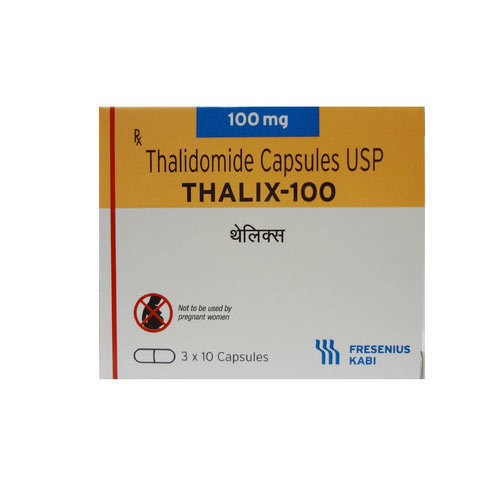thalimax THALIDOMIDE
Introduction to thalimax
Thalimax is a medication primarily used in the form of tablets to treat specific medical conditions. Thalimax is commonly prescribed for managing multiple myeloma, a type of blood cancer, and leprosy, a bacterial infection affecting the skin and nerves. It helps reduce inflammation and manage certain skin conditions associated with leprosy.
Composition of thalimax
Thalimax contains the active ingredient Thalidomide, which is responsible for its therapeutic effects. Thalidomide works by modulating the immune system, reducing inflammation, and inhibiting the growth of new blood vessels, thereby slowing cancer cell growth.
Uses of thalimax
- Treatment of multiple myeloma
- Management of leprosy
- Reduction of inflammation
- Management of certain skin conditions associated with leprosy
Side effects of thalimax
- Drowsiness (feeling of sleepiness)
- Dizziness
- Constipation (difficulty in passing stools)
- Potential for blood clots
- Nerve damage
Precautions of thalimax
Thalimax is contraindicated in pregnant women due to the risk of severe birth defects. Women of childbearing age must use effective birth control while taking this medication. It is important to monitor for blood clots and nerve damage during treatment.
How to Take thalimax
The usual starting dose for adults is 100 mg taken once daily, usually at bedtime. The maximum recommended dose is 400 mg per day. It is crucial to take Thalimax exactly as prescribed by your doctor. Follow your doctor’s advice for the correct way to use your prescribed form, whether it’s a tablet, injection, or topical form.
Conclusion of thalimax
Thalimax, containing the active ingredient Thalidomide, belongs to the therapeutic class of immunomodulatory drugs. It is primarily used for treating multiple myeloma and leprosy. Manufactured with care, Thalimax offers significant benefits in managing these conditions. Always follow your healthcare provider's instructions when using Thalimax to ensure safety and effectiveness.


Can I take Thalimax with other prescription drugs?
Thalimax can interact with other medications, increasing the risk of side effects. For example, it can enhance the sedative effects of drugs that cause drowsiness, like antihistamines or sleep aids. It may also increase the risk of blood clots when taken with certain cancer treatments. Always inform your doctor about all medications you're taking to avoid potential interactions. Your doctor can adjust your treatment plan to minimize risks and ensure safety.

Can Thalimax be taken safely while breastfeeding?
Thalimax is not recommended while breastfeeding. We don't have much information about whether it passes into human breast milk. However, due to the potential risks to a baby's development, it's best to avoid Thalimax while nursing. If you're taking Thalimax and want to breastfeed, talk with your doctor about safer medication options that would allow you to nurse your baby safely.

Can Thalimax be taken safely while pregnant?
Thalimax is not safe during pregnancy. It can cause severe birth defects, which are serious abnormalities in a baby's development. These defects can affect the limbs, heart, and other organs. Women of childbearing age must use two forms of birth control while taking Thalimax. If you're pregnant or planning to become pregnant, talk with your doctor about safer alternatives. Your doctor can help create a treatment plan that protects both you and your baby.

Does Thalimax affect appetite?
Thalimax can affect appetite, but this is not common. Some people may experience increased appetite, which is a desire to eat more, while others might lose their appetite. These changes are usually mild. If you notice unexpected changes in your appetite after starting Thalimax, talk with your doctor. For mild appetite changes, try maintaining regular meal times and eating a balanced diet. Your doctor can help determine if any appetite changes you experience are related to Thalimax.

Does Thalimax affect mood?
Thalimax can affect mood, but this is not common. Some people may experience mood changes, anxiety, or feelings of agitation, which are feelings of restlessness or nervousness. If you notice changes in your mood or mental well-being after starting Thalimax, talk with your doctor. These symptoms might be related to something else, like stress or another health condition. Your doctor can help determine what's causing any mental health changes you experience and suggest appropriate support.

Does Thalimax affect sleep?
Thalimax can interfere with sleep, but this is not common. Some people may experience insomnia, which is difficulty falling or staying asleep. If you notice changes in your sleep patterns after starting Thalimax, talk with your doctor. Sleep problems might be related to something else, like stress or another medication. Your doctor can help figure out what's causing your sleep issues and suggest ways to improve your rest while continuing your treatment.

Does Thalimax cause headaches?
Thalimax can cause headaches, but this side effect is considered rare. Most people taking Thalimax do not experience headaches. If you do get a mild headache, staying hydrated and resting may help. Over-the-counter pain relievers can also be used, but check with your doctor first. If you experience severe or persistent headaches, contact your healthcare provider. They can help determine if the headaches are related to Thalimax or if another cause needs attention.

Does Thalimax cause stomach upset?
Thalimax can cause stomach upset, but this is not common. Some people may experience nausea, which is a feeling of sickness in the stomach, or constipation, which is difficulty in passing stools. These side effects are usually mild. Taking Thalimax with food might help reduce nausea. If you experience severe or persistent stomach issues, talk with your doctor. They can help determine if these symptoms are related to Thalimax or if another cause needs attention.

Does Thalimax cause weight gain?
Thalimax can cause weight changes, but this is not common. Some people may experience weight gain due to increased appetite, which is a desire to eat more. Others might lose weight due to side effects like nausea. These changes are usually mild. If you notice significant weight changes, talk with your doctor. They can help determine if these changes are related to Thalimax and suggest ways to manage them.

Does Thalimax interfere with sexual function?
Thalimax can interfere with sexual function. It may cause erectile dysfunction, which is difficulty in getting or maintaining an erection, and loss of libido, which is a reduced interest in sexual activity. These side effects are considered occasional, meaning they occur in less than 10% of people taking the medication. The severity can range from mild to moderate. If you experience these side effects, talk to your doctor. They can suggest ways to manage these issues, such as adjusting your medication or trying other treatments to help maintain your sexual health.

Does Thalimax limit driving?
Thalimax can affect your ability to drive safely. It can cause dizziness and drowsiness, which are feelings of sleepiness or tiredness. These side effects can impair your reaction time and concentration. If you feel dizzy or drowsy after taking Thalimax, avoid driving until these symptoms go away. When you first start the medication, pay attention to how your body responds before getting behind the wheel. Talk with your doctor if you have concerns about driving.

Does Thalimax make it hard to think or concentrate?
Thalimax can cause difficulty concentrating, but this is not common. Most people take Thalimax without experiencing changes in their mental focus or memory. If you notice problems with your thinking after starting Thalimax, talk with your doctor. These symptoms might be related to something else, such as fatigue or another health condition. Your doctor can help determine what's causing these issues and suggest solutions while keeping your treatment plan on track.

Does Thalimax make people tired or drowsy?
Thalimax can cause drowsiness and fatigue, which are feelings of sleepiness or tiredness. These side effects are common and can vary in severity. If you notice you're feeling very sleepy or fatigued while taking Thalimax, talk with your doctor. Your tiredness might be caused by the medication or another health condition. Your doctor can help determine what's causing your symptoms and recommend appropriate adjustments to your treatment plan. Proper rest and a balanced diet can help maintain your energy levels.

For how long do I take Thalimax?
Thalimax is usually taken long-term for chronic conditions like multiple myeloma, which is a type of blood cancer. The duration of use depends on your response to treatment and any side effects you experience. Your doctor will determine how long you need to take Thalimax based on your specific health needs. Always talk with your doctor before changing or stopping your Thalimax treatment to ensure your condition remains well-managed.

How does Thalimax work?
Thalimax works by modulating the immune system and reducing inflammation. It belongs to a class of drugs called immunomodulatory agents. Think of it like a thermostat for your immune system, helping to regulate its activity. Thalimax also inhibits the growth of new blood vessels, which can slow the growth of cancer cells. These effects make it useful for treating conditions like multiple myeloma and leprosy. Your doctor will explain how Thalimax works for your specific condition.

How do I know if Thalimax is working?
You'll know Thalimax is working if you notice improvements in your condition. For multiple myeloma, this might mean fewer symptoms like bone pain or fatigue. Your doctor will monitor your progress with blood tests and other assessments. For leprosy, you might see a reduction in skin lesions. Regular check-ups with your doctor are important to ensure Thalimax is working effectively for your condition. Your doctor may adjust your treatment based on these results.

How do I take Thalimax?
Take Thalimax exactly as your doctor prescribes. It's usually taken once daily, preferably at bedtime, to reduce the risk of side effects like dizziness. Swallow the capsules whole with water, without crushing or chewing them. It's important to take Thalimax on an empty stomach, at least one hour after eating. If you miss a dose, take it as soon as you remember, unless it's close to your next dose. In that case, skip the missed dose and continue with your regular schedule. Never take two doses at once. Avoid alcohol and follow any dietary restrictions your doctor advises.

How long does it take for Thalimax to start working?
Thalimax starts working in your body shortly after you take it, but the full therapeutic effects may take several weeks to become noticeable. For conditions like multiple myeloma, you might see improvements in symptoms like bone pain or fatigue within a few weeks. The time it takes for Thalimax to work can depend on your overall health and the specific condition being treated. Always take it exactly as prescribed for the best results.

How should I store Thalimax?
Store Thalimax at room temperature, away from moisture and light. Keep it in its original container, tightly closed, to protect it from damage. Avoid storing it in humid places like bathrooms, where moisture can affect its effectiveness. If your pills came in packaging that isn't child-resistant, transfer them to a container that children can't easily open. Always store Thalimax out of children's reach to prevent accidental swallowing. Check the expiration date regularly and properly dispose of any unused or expired medication.

Is it safe to drink alcohol while taking Thalimax?
It's best to avoid alcohol while taking Thalimax. Alcohol can increase the risk of side effects like dizziness and drowsiness, which are feelings of sleepiness or tiredness. These effects can impair your ability to perform tasks that require alertness. If you choose to drink occasionally, limit your alcohol intake and watch for warning signs like increased dizziness. Talk with your doctor about alcohol use while taking Thalimax to get personalized advice.

Is it safe to drink coffee or tea while taking Thalimax?
You can drink coffee and tea while taking Thalimax. There's no known interaction between caffeine and Thalimax. However, caffeine can cause increased heart rate and jitteriness, which are feelings of nervousness or anxiety. If you notice these symptoms, try to enjoy caffeinated drinks in moderation. Make sure you drink plenty of water throughout the day. If you have concerns about caffeine intake, talk with your doctor.

Is it safe to exercise while taking Thalimax?
You can exercise while taking Thalimax, but be cautious. Thalimax can cause dizziness and drowsiness, which might affect your balance and coordination during physical activity. To exercise safely, start with light activities and gradually increase intensity. Drink plenty of water before, during, and after exercise to stay hydrated. If you feel dizzy or unusually tired, stop exercising and rest. Talk with your doctor if you have concerns about your exercise routine.

Is Thalimax effective?
Thalimax is effective for certain conditions. It's used to treat multiple myeloma, which is a type of blood cancer, and leprosy, which is a bacterial infection affecting the skin and nerves. Thalimax works by modulating the immune system and reducing inflammation. Clinical studies show it can improve survival rates and reduce symptoms in these conditions. Your doctor will monitor your progress to ensure Thalimax is working effectively for you.

Is Thalimax safe for the elderly?
Elderly individuals are more vulnerable to the side effects of Thalimax. They may experience increased dizziness, drowsiness, and risk of blood clots. These side effects can lead to falls or other complications. Thalimax can still be used in the elderly, but with careful monitoring. Doctors may adjust the dose to minimize risks. Regular check-ups are important to ensure the medication is safe and effective for older adults.

What are Thalimax possible harms and risks?
Common side effects include drowsiness, dizziness, constipation, and neuropathy. Serious risks include severe birth defects, blood clots, and nerve damage, which can be permanent. Peripheral neuropathy occurs in more than 10% of patients, and blood clot risk is higher with certain cancer treatments.

What disease or symptom is Thalimax used for?
Thalimax is used to treat multiple myeloma, which is a type of blood cancer, and leprosy, which is a bacterial infection affecting the skin and nerves. It helps reduce inflammation and slow the growth of cancer cells. Thalimax is also used to manage certain skin conditions associated with leprosy. It can be used alone or in combination with other therapies, depending on your specific health needs. Your doctor will determine the best treatment plan for you.

What is Thalimax?
Thalimax is a medication used to treat multiple myeloma, which is a type of blood cancer, and leprosy, which is a bacterial infection affecting the skin and nerves. It belongs to a class of drugs called immunomodulatory agents, which help regulate the immune system. Thalimax works by reducing inflammation and slowing the growth of cancer cells. It's also used to manage certain skin conditions associated with leprosy. Your doctor will determine if Thalimax is appropriate for your condition.

What is the usual dose of Thalimax?
The usual starting dose of Thalimax for adults is 100 mg taken once daily, usually at bedtime. Your doctor may adjust the dose based on your response and any side effects. The maximum recommended dose is typically 400 mg per day. For certain conditions, like multiple myeloma, the dose may vary. Dose adjustments may be necessary for elderly patients or those with kidney problems. Always follow your doctor's specific dosing instructions for your health needs.

Who should avoid taking Thalimax?
Thalimax has absolute contraindications, meaning it must not be used in certain situations. It's absolutely contraindicated in pregnant women due to the risk of severe birth defects. Women of childbearing age must use effective birth control. Thalimax is also contraindicated in people with a known allergy to it. Relative contraindications include conditions like severe nerve damage, where caution is needed. Always consult your doctor about these concerns.
Available in 2 variations

Thalimax 50mg Capsule
strip of 10 capsules

Thalimax 100mg Capsule
strip of 10 capsules












.svg)
